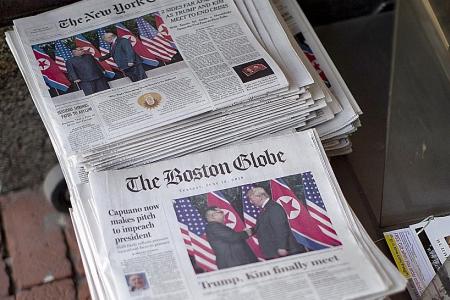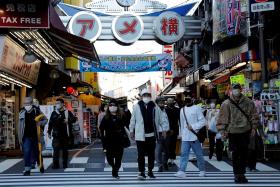Analysts sceptical of latest US-North Korea deal
They say language is milder than previous agreements and end of 'war games' is major concession to Pyongyang
US-based experts with experience of negotiating with or studying North Korea remain sceptical of the US-North Korea declaration signed in Singapore yesterday.
The document mentioned denuclearisation but not the US demand of "complete, verifiable and irreversible denuclearisation (CVID)".
The language only reaffirmed previous agreements and, in some cases, was milder. And US President Donald Trump's decision to scrap "war games" - longstanding joint military exercises with South Korea - was seen as a major concession to Pyongyang.
"The denuclearisation pledge is diluted from the Six-Party Talks provision, and there was no mention of North Korea moving towards CVID as the administration had hinted at," Dr Bruce Klingner, senior research fellow for North-east Asia at US think-tank The Heritage Foundation, told The Straits Times.
WEAKER
"Overall, the Trump-Kim declaration appears weaker than the 1992 inter-Korean agreement, (former president Bill) Clinton's 2000 communique, and the Six-Party Talks statements of 2005 and 2007. Notably, there was no mention of verification or human rights," he added.
Dr Adam Mount, a senior fellow and director of the Defence Posture Project at the Federation of American Scientists, tweeted that the language on denuclearisation was "stunningly weak, even though I expected little".
Dr Klingner acknowledged the document could have been worse.
Mr Trump did not pledge to move towards a peace declaration or treaty, and potentially putting the 28,000-odd US troops in South Korea on the table.
Nor were there any US concessions on sanctions relief, normalisation of relations absent progress in human rights or a more extensive security guarantee to the regime than previously provided, he said.
Dr Lee Sung Yoon, professor of Korean studies at the Fletcher School of Law and Diplomacy at Tufts University in Massachusetts, had a more negative view.
"It is a blank cheque for Pyongyang, a free pass to carry on as (North Korea leader Kim Jong Un) pleases, as his regime has for decades," he said.
"It empowers China and South Korea not only to stop enforcing sanctions but also to return to resuming the generous subvention schemes of the past, when nearly US$1 billion (S$1.3 billion) a year would flow from Seoul to Pyongyang's coffers, and considerably more from Beijing."
Dr Denny Roy of the East-West Centre in Honolulu said: "The most striking substantive result of the Trump-Kim summit is Mr Trump apparently agreeing to 'stopping the war games' while US negotiations with North Korea are going on.
"Critics will pounce on this as a mistake on several levels. The purpose of those exercises is to maintain the readiness of South Korean and US forces to defend South Korea if necessary; they are a permanent necessity to maintain deterrence, not a bargaining chip."
That Mr Trump called the war games "provocative" essentially parroted the North Korean position.
"This is a major win for (North Korea), which of course wants to weaken the US-South Korea alliance and eventually send the US troops home," Dr Roy said.
But it was encouraging that Mr Trump does not plan to lift US sanctions immediately and expects North Korea to admit US inspectors to verify denuclearisation compliance, and maintain its cessation of nuclear explosion and missile flight tests, he noted.
The best outcome from the summit would be the start of a sustainable, longer-term diplomatic process, said Mr Mintaro Oba, a former State Department official who has worked on North Korea policy.
Added Dr Klingner: "This was an IOU statement promising to do better in the future."
Get The New Paper on your phone with the free TNP app. Download from the Apple App Store or Google Play Store now


